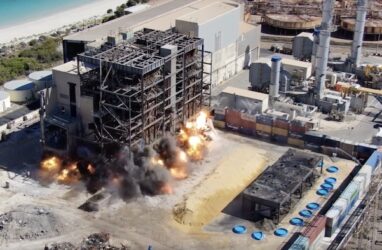The Reserve Bank of New Zealand’s dovish shift, including the larger 50 bp cut at its October monetary policy meeting, saw the official cash rate fall to 2.5%, down 3.0% from its most recent peak: The sharp drop in the official cash rate has been matched in the mortgage market, where rates have fallen back
The post New Zealand’s house price crash has silver lining appeared first on MacroBusiness.
Given that it appears the Albense government is, once again, set to sell you out to the gas cartel with fake domestic reservation, it falls to me to point out one final irony. Just as Australia moves to do a fake version of what it should have done in 2012, a global gas glut of
The post LNG imports are Australia’s last energy hope appeared first on MacroBusiness.
Victorians are experiencing acute Stockholm Syndrome, wedded to the failing state Labor government who has been in power for 22 of the past 26 years. Victoria’s nine-month lockdown during the Covid-19 outbreak was among the longest and most severe in the world. It was also brought to us by the state government, whose incompetence with
We all understand the wisdom of Professor Michael Pettis. Today, he returns to discuss the implications for Australia of a severe China adjustment. “I don’t think overly emphasising commodity production is good for long-term growth because I don’t think productivity growth in commodity production compares with productivity growth in manufacturing,” he says. “Many people see
The Albanese government claims it wants to reduce immigration to Australia. However, its actions on the international student front say otherwise. Australia already has the highest share of international students and graduates in the world, accounting for 3.2% of the nation’s population as of Q3 2025, up from the pre-pandemic peak of 2.9%. However, the
Virtually all infrastructure experts opposed the Victorian government’s Suburban Rail Loop (SRL) because the cost was prohibitively high, the project lacked a business case, failed any objective cost-benefit analysis, and would not generate enough customer demand. For example, Victoria’s Parliamentary Budget Office (PBO) conducted a cost-benefit analysis and discovered that the SRL East and North
The Market Ear leads us off. Delicate levels NASDAQ is trading right on the 50-day moving average. Friday saw a huge doji candle, indicating nobody is in control. Let’s see how this develops from here, but the longer-term trend line is a must-hold. Source: LSEG Workspace Relative tech stress VXN – VIX spread has shot
The post AI bubble quivers again appeared first on MacroBusiness.
With the release of the latest polling RedBridge, it was revealed that Labor now hold 51% of the votes of Gen Z, followed by the Greens with 24% of the vote. This compares with Labor securing 40.3% of the Gen Z vote at the ballot box at May’s federal election, with 27.2% for the Coalition
The post The coming war within the LNP appeared first on MacroBusiness.
Australia’s labour market has been gradually softening over the past year. This softening is evident in the gradual rise in Australia’s unemployment rate: As illustrated below by AMP chief economist Shane Oliver, the various measures of job openings have also weakened: Alex Joiner, chief economist at IFM Investors has published an interesting set of charts
This is ridiculous in every way. In his first public interview on the issue, Australia Pacific LNG chief executive Dan Clark told The Australian that the east coast market’s chronic pressures cannot be solved with the series of band-aid solutions that have been applied over recent years. The call comes as the federal government prepares




